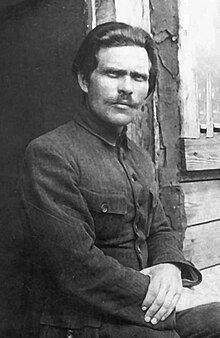Our website is made possible by displaying online advertisements to our visitors.
Please consider supporting us by disabling your ad blocker.
Nestor Makhno
Nestor Makhno | |
|---|---|
Нестор Махно | |
 Makhno in 1921 | |
| Otaman of the Makhnovshchina | |
| In office 30 September 1918 – 28 August 1921 | |
| Preceded by | Position established |
| Succeeded by | Viktor Bilash |
| Chairman of the Military Revolutionary Council | |
| In office 27 July 1919 – 1 September 1919 | |
| Preceded by | Ivan Chernoknizhny |
| Succeeded by | Volin |
| Personal details | |
| Born | 7 November [O.S. 26 October] 1888 Huliaipole, Katerynoslav Governorate, Russian Empire |
| Died | 25 July 1934 (aged 45) Paris, France |
| Cause of death | Tuberculosis |
| Spouses | |
| Children | Elena Mikhnenko |
| Part of a series on the |
| Makhnovshchina |
|---|
 |
Nestor Ivanovych Makhno[a] (Ukrainian: Нестор Івaнович Махно, pronounced [ˈnɛstor iˈʋɑnowɪt͡ʃ mɐxˈnɔ]; 7 November 1888 – 25 July 1934), also known as Bat'ko Makhno (батько Махно, lit. 'Father Makhno'),[b] was a Ukrainian anarchist revolutionary and the commander of the Revolutionary Insurgent Army of Ukraine during the Ukrainian War of Independence. He established the Makhnovshchina (loosely translated as "Makhno movement"), a mass movement by the Ukrainian peasantry to establish anarchist communism in the country between 1918 and 1921. Initially centered around Makhno's home province of Katerynoslav and hometown of Huliaipole, it came to exert a strong influence over large areas of southern Ukraine, specifically in what is now the Zaporizhzhia Oblast of Ukraine.
Raised by a peasant family and coming of age amid the fervor around the 1905 Revolution, Makhno participated in a local anarchist group and spent seven years imprisoned for his involvement. With his release during the 1917 Revolution, Makhno became a local revolutionary leader in his hometown and oversaw the expropriation and redistribution of large estates to the peasantry. In the Ukrainian Civil War, Makhno sided with the Soviet Russian Bolsheviks against the Ukrainian nationalists and White movement, but his alliances with the Bolsheviks did not last. He rallied Bolshevik support to lead an insurgency, defeating the Central Powers' occupation forces at the Battle of Dibrivka and establishing the Makhnovshchina. Makhno's troops briefly integrated with the Bolshevik Red Army in the 1919 Soviet invasion of Ukraine, but split over differences on the movement's autonomy. Makhno rebuilt his army from the remains of Nykyfor Hryhoriv's forces in western Ukraine, routed the White Army at the Battle of Perehonivka, and captured most of southern and eastern Ukraine, where they again attempted to establish anarchist communism.
Makhno's army fought the Bolshevik re-invasion of Ukraine in 1920 until a White Army offensive forced a short-lived Bolshevik–Makhnovist alliance that drove the Whites out of Crimea and ended the Southern Front of the Russian Civil War. The Bolsheviks immediately turned on Makhno, wounding him and driving him westward in August 1921 to Romanian concentration camps, Poland, and Europe, before he settled in Paris with his wife and daughter. Makhno wrote memoirs and articles for radical newspapers, playing a role in the development of platformism. He became alienated from the French anarchist movement after disputes over synthesis anarchism and personal allegations of antisemitism. His family continued to be persecuted in the decades following his death of tuberculosis at the age of 45. Anarchist groups continue to draw on his name for inspiration.
- ^ Palij 1976, p. 67; Peters 1970, p. 14.
- ^ Skirda 2004, p. 9.
Cite error: There are <ref group=lower-alpha> tags or {{efn}} templates on this page, but the references will not show without a {{reflist|group=lower-alpha}} template or {{notelist}} template (see the help page).
Previous Page Next Page


